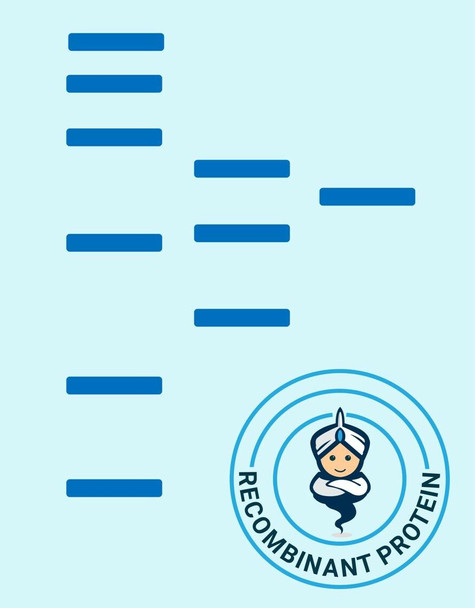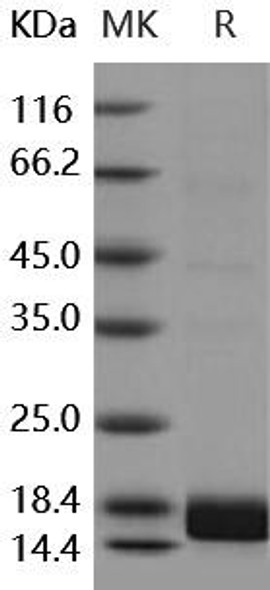Description
| Product Name: | Human ACVR1 Recombinant Protein |
| Product Code: | RPPB0009 |
| Size: | 10µg |
| Species: | Human |
| Target: | ACVR1 |
| Synonyms: | ACVR1A, ALK2, ACVR1, ACTRI, ACTR-I, ACVRLK2, FOP, SKR1, TSRI, Activin receptor type I, Activin receptor-like kinase 2, ALK-2, TSR-I, Serine/threonine-protein kinase receptor R1, TGF-B superfamily receptor type I. |
| Source: | Sf9 Insect cells |
| Physical Appearance: | Sterilefiltered colorless solution. |
| Formulation: | ACVR1 protein solution (0.25mg/ml) contains Phosphate Buffered Saline (pH 7.4) and 10% glycerol.� |
| Stability: | Store at 4°C if entire vial will be used within 2-4 weeks.Store, frozen at -20°C for longer periods of time. For long term storage it is recommended to add a carrier protein (0.1% HSA or BSA).Avoid multiple freeze-thaw cycles. |
| Purity: | Greater than 90.0% as determined by SDS-PAGE. |
| Amino Acid Sequence: | MEDEKPKVNP KLYMCVCEGL SCGNEDHCEG QQCFSSLSIN DGFHVYQKGC FQVYEQGKMTCKTPPSPGQA VECCQGDWCN RNITAQLPTK GKSFPGTQNF HLELEPKSCD KTHTCPPCPAPELLGGPSVF LFPPKPKDTL MISRTPEVTC VVVDVSHEDP EVKFNWYVDG VEVHNAKTKPREEQYNSTYR VVSVLTVLHQ DWLNGKEYKC KVSNKALPAP IEKTISKAKG QPREPQVYTLPPSRDELTKN QVSLTCLVKG FYPSDIAVEW ESNGQPENNY KTTPPVLDSD GSFFLYSKLTVDKSRWQQGN VFSCSVMHEA LHNHYTQKSL SLSPGKHHHH HH |
Activin A Receptor Type 1 (ACVR1) is a member of TGF-beta serine/threonine kinase receptor family. ACVR1 forms a receptor complex contains2 type II and 2 type I transmembrane serine/threonine kinases. Type II receptors phosphorylate and activate type I receptors which autophosphorylate,bind and activate SMAD transcriptional regulators. ACVR1 takes part in left-right pattern formation during embryogenesis and is also essential in the BMP pathway which is responsible for the development and repair of the skeletal system.ACVR1 is linked to Fibrodysplasia Ossificans Progressiva which isknown for the formation of heterotopic bone throughout the body.
ACVR1 produced in Sf9 Baculovirus cells is a single, glycosylated polypeptide chain containing 342 amino acids (21-123a.a.) and having a molecular mass of 38.4kDa. ACVR1 is expressed with a 239 amino acid hIgG-His-Tag at C-Terminus and purified by proprietary chromatographic techniques.
| UniProt Protein Function: | ALK2: On ligand binding, forms a receptor complex consisting of two type II and two type I transmembrane serine/threonine kinases. Type II receptors phosphorylate and activate type I receptors which autophosphorylate, then bind and activate SMAD transcriptional regulators. Receptor for activin. May be involved for left-right pattern formation during embryogenesis. Interacts with FKBP1A. Interacts with FCHO1. Expressed in normal parenchymal cells, endothelial cells, fibroblasts and tumor-derived epithelial cells. Belongs to the protein kinase superfamily. TKL Ser/Thr protein kinase family. TGFB receptor subfamily. |
| UniProt Protein Details: | Protein type:Membrane protein, integral; Kinase, protein; Protein kinase, TKL; EC 2.7.11.30; Protein kinase, Ser/Thr (receptor); TKL group; STKR family; Type1 subfamily Chromosomal Location of Human Ortholog: 2q23-q24 Cellular Component: activin receptor complex; integral to plasma membrane Molecular Function:activin binding; activin receptor activity, type I; ATP binding; protein binding; protein homodimerization activity; protein kinase activity; protein serine/threonine kinase activity; SMAD binding; transforming growth factor beta binding Biological Process: activin receptor signaling pathway; BMP signaling pathway; G1/S transition of mitotic cell cycle; negative regulation of activin receptor signaling pathway; negative regulation of signal transduction; peptidyl-threonine phosphorylation; positive regulation of bone mineralization; positive regulation of cell migration; positive regulation of osteoblast differentiation; positive regulation of transcription from RNA polymerase II promoter; positive regulation of transcription, DNA-dependent; protein amino acid phosphorylation; regulation of ossification; transforming growth factor beta receptor signaling pathway Disease: Fibrodysplasia Ossificans Progressiva |
| NCBI Summary: | Activins are dimeric growth and differentiation factors which belong to the transforming growth factor-beta (TGF-beta) superfamily of structurally related signaling proteins. Activins signal through a heteromeric complex of receptor serine kinases which include at least two type I ( I and IB) and two type II (II and IIB) receptors. These receptors are all transmembrane proteins, composed of a ligand-binding extracellular domain with cysteine-rich region, a transmembrane domain, and a cytoplasmic domain with predicted serine/threonine specificity. Type I receptors are essential for signaling; and type II receptors are required for binding ligands and for expression of type I receptors. Type I and II receptors form a stable complex after ligand binding, resulting in phosphorylation of type I receptors by type II receptors. This gene encodes activin A type I receptor which signals a particular transcriptional response in concert with activin type II receptors. Mutations in this gene are associated with fibrodysplasia ossificans progressive. [provided by RefSeq, Jul 2008] |
| UniProt Code: | Q04771 |
| NCBI GenInfo Identifier: | 462447 |
| NCBI Gene ID: | 90 |
| NCBI Accession: | Q04771.1 |
| UniProt Related Accession: | Q04771 |
| Molecular Weight: | 57,153 Da |
| NCBI Full Name: | Activin receptor type-1 |
| NCBI Synonym Full Names: | activin A receptor type 1 |
| NCBI Official Symbol: | ACVR1�� |
| NCBI Official Synonym Symbols: | FOP; ALK2; SKR1; TSRI; ACTRI; ACVR1A; ACVRLK2�� |
| NCBI Protein Information: | activin receptor type-1 |
| UniProt Protein Name: | Activin receptor type-1 |
| UniProt Synonym Protein Names: | Activin receptor type I; ACTR-I; Activin receptor-like kinase 2; ALK-2; Serine/threonine-protein kinase receptor R1; SKR1; TGF-B superfamily receptor type I; TSR-I |
| Protein Family: | Activin receptor |
| UniProt Gene Name: | ACVR1�� |
| UniProt Entry Name: | ACVR1_HUMAN |









